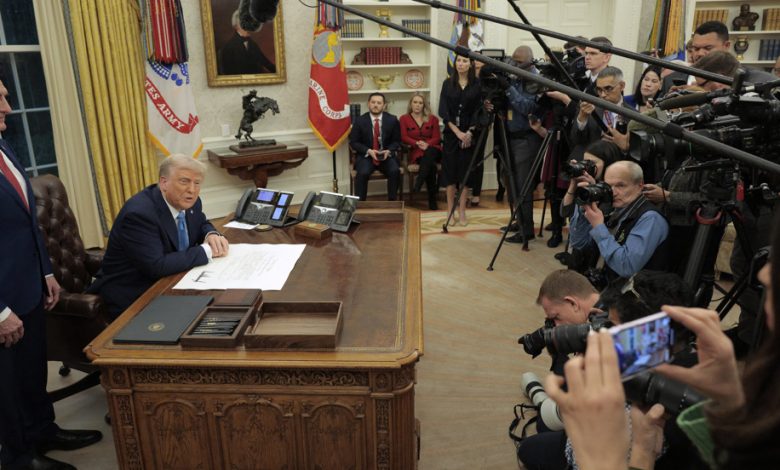Canada and Mexico announced the implementation of retaliatory tariffs on US, while China pledged to take countermeasures
In a significant escalation of international trade tensions, Canada, Mexico, and China have pledged to retaliate following President Donald Trump's decision to impose tariffs on these nations. The move has positioned the United States at the center of a potential trade conflict with its two North American neighbors and an economic powerhouse.

On Saturday, former President Donald Trump declared the imposition of comprehensive tariffs on Canada, China, and Mexico, the three principal trade partners of the United States.
The Trump administration has stated that the imposition of tariffs is intended to curb the influx of drugs and undocumented immigrants into the United States. However, these measures could result in significant price hikes for American consumers on a wide range of everyday products, including avocados, sneakers, and automobiles.
The newly implemented policy signifies a significant shift away from the largely duty-free trade framework that has been in place among the three North American countries for several years. Additionally, it marks a further intensification of the ongoing trade conflict between China and the United States, which has escalated through the past two presidential administrations.
In line with previous commitments, former President Donald Trump has announced the imposition of a 25% tariff on all imports from Mexico and the majority of Canadian goods. Additionally, a 10% tariff will be applied to Chinese imports entering the United States.
The tariffs will be implemented without any exemptions, and the executive order signed by President Trump on Saturday will eliminate the de minimis loophole. Previously, this loophole permitted shipments valued at $800 or less to enter the United States without taxation.
In response to new trade measures imposed by the United States, Mexico and Canada, which stand as the country’s leading trading partners, have swiftly announced plans to implement retaliatory tariffs. Concurrently, China declared its intention to contest the decision at the World Trade Organization and pursue additional countermeasures.
In the wake of former President Donald Trump’s recent decision, Prime Minister Justin Trudeau swiftly responded by declaring the imposition of 25% retaliatory tariffs on American products. This move, described as extensive and encompassing everyday consumer goods, fulfills Trudeau’s pledge for Canada to respond both decisively and promptly to any U.S.-imposed tariffs.
In a press conference held on Saturday evening, the Canadian leader declared that Canada will implement a 25% tariff on American products valued at $155 billion in direct response to recent trade measures enacted by the United States.
Prime Minister Justin Trudeau has stated that former President Donald Trump’s actions will not only adversely affect Canadians but will also have significant repercussions for the American populace.
On Saturday, President Claudia Sheinbaum declared that Mexico will implement retaliatory tariffs and additional measures in response to the tariffs imposed by former U.S. President Donald Trump.
Sheinbaum announced that Mexico’s Ministry of Economy is set to activate “Plan B,” a strategic initiative they have been developing. This plan encompasses both tariff and non-tariff measures aimed at safeguarding Mexico’s interests.
The President of Mexico has firmly denied claims from the White House suggesting an alliance between drug cartels and his government, labeling the accusation as “slander.” This statement comes after the allegation was reportedly used by the Trump administration to justify the imposition of tariffs.
She stated that if the United States government and its agencies aim to tackle the significant issue of fentanyl consumption within the country, they must take measures to combat the sale of narcotics on the streets of major cities.
China declared on Sunday its strong opposition to the tariffs levied against Beijing and stated its intention to implement “appropriate countermeasures” to firmly protect its rights and interests.
China’s Ministry of Commerce has announced its intention to initiate legal proceedings at the World Trade Organization, contending that the United States’ unilateral tariff imposition constitutes a significant breach of WTO regulations.
The Chinese Ministry has urged the United States to adopt an objective and rational approach in addressing its domestic challenges, such as the fentanyl crisis. The Ministry emphasized the need for constructive dialogue, rather than resorting to tariff threats against other nations.
In his executive orders, former President Donald Trump indicated that should the affected nations choose to retaliate against the newly imposed tariffs, he retains the authority to escalate or broaden the scope of these duties. This move is intended to uphold the effectiveness of the action.
The President of the National Foreign Trade Council, Jake Colvin, expressed concerns that former President Trump’s actions could lead to increased costs on a wide range of goods, including avocados and automobiles. Colvin called on the United States, Canada, and Mexico to swiftly seek a resolution to prevent further escalation of the situation.
A recent study conducted by the Peterson Institute for International Economics indicates that the tariff strategy employed under former President Donald Trump could result in higher costs for a wide range of consumer goods in the United States. The findings suggest that American shoppers may see price increases on a variety of products, including imported sneakers, toys, and even food items.







